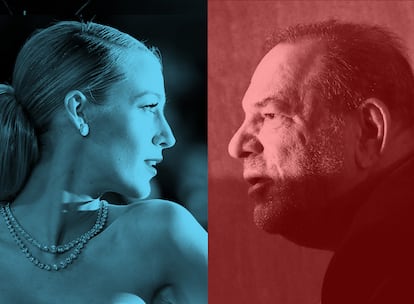Harvey Weinstein is ‘not that bad’ and Blake Lively is ‘not a good person‘: How the American right has turned the tables
While the producer, convicted of multiple crimes, is starting to be viewed favorably, the actress, who has sued a co-star for harassment, is portrayed as a villain

The culture wars, Ayn Rand said, may seem bloodless to us, but no one in their right mind should allow themselves the luxury of losing them. Rand’s contemporary disciples, who are many and very illustrious, have not lost sight of the lesson of the mother of objectivism and fertile narcissism. For them, any opportunity is good when it comes to imposing your agenda and attracting new followers, whether it’s the skin color of Disney princesses, the sex, gender identity or sexual orientation of silver-screen icons, or the optimal level of tan that should be required for the testicles of a virile man.
In the United States, the effervescent manosphere, patriotic circles, and other remnants of belligerently Trumpian cultural warriors believe that nothing human is alien to them and that any trivial quarrel or frivolous controversy can serve their purposes. Just look at what’s happening with Blake Lively and Harvey Weinstein, who have become the epicenter of a cultural conflagration whose virulence never ceases to shock.
Lively, a 37-year-old California actress and model, is establishing herself as a prime target of hate on ultra-conservative social media. Meanwhile, former New York movie producer Weinstein, sentenced in 2020 to 23 years in prison, exonerated in 2024 over procedural errors but still awaiting further trials, now enjoys the unconditional support of those who denigrate Lively and see in him an innocent martyr of the #MeToo hysteria and the “excesses” of political correctness.
Lively in the crosshairs
Rand had a very personal way of joining battle in the culture wars of her time. She would lock herself in her Park Avenue apartment, stocked with industrial quantities of tobacco, chocolates, and amphetamines, and write tirelessly, in feverish sessions of up to 20 hours, interrupted only to shower mid-morning. Candace Owens, by contrast, manages to wage her cultural battles with far less effort — and far greater impact. The Catholic activist and illustrious vlogger has mentioned Lively up to 30 times on her video podcast and YouTube channel.
In Owens’ opinion, Lively has become a symptom of the spiritual decadence of the United States, one of the drivers of that woke tyranny which, in Owens’ view, may have lost control of the White House, but retains factual, social, and media power. Owens recently once again addressed the confusing dispute between Lively and her former co-star, Justin Baldoni. For the commentator, it’s clear that the actress is illegitimately using her position of power, as a member of Hollywood’s progressive high aristocracy, to obtain business benefits, even if it means dragging the good name of “a poor sap” like Baldoni through the mud.
Back in January, she stated that Lively, obviously, “is not a good person.” And that this undeniable evil can be attributed to her activism in “the cause of modern feminism.” Those who listen to Owens with any regularity already know what these words imply. For her, feminism is a worthy and legitimate school of thought until you add the adjective “modern.” In that case, it becomes a perverse and harmful ideology.
Media outlets like Evie Magazine unwaveringly support Owens in her crusade against Lively. Nicole Dominique, a staff writer for the publication, believes that “liberals and conservatives alike” already share a definitive verdict on Lively and her “infamous” lawsuit against Baldoni: she is an unscrupulous opportunist. Her accusations (the actress claims that her co-star in the film It Ends with Us contributed to a hostile climate toward her during filming, sexually harassed her, and overstepped her boundaries in sex scenes, even ignoring the instructions of intimacy coordinators) are, for Sheridan, “obviously” false, as well as cynical and completely unethical.
Nobody knows anything?
The icing on the cake, in the opinion of many conservative-leaning commentators, was the decision to call Taylor Swift as a witness. Swift reportedly insisted that Lively keep her out of the loop and not make her collateral damage in such a murky and confusing affair. But, at least in the opinion of Janelle Ash of Fox News, Lively ignored her pleas and ended up implicating her, further demonstrating that the Baldoni affair has become an all-out war in which no prisoners are being taken.
They say that whoever loses a friend loses a treasure. And everything points to Lively having just lost an ally as illustrious as Swift, godmother to Lively’s four children with fellow actor Ryan Reynolds.
And what does Joe Rogan think about all this? The man behind one of the most listened-to podcasts on the planet has dedicated several episodes of The Joe Rogan Experience to the Lively-Baldoni showdown. In the latest episode, to no one’s surprise, Rogan and his guest, Brendan Schaub, agreed that Lively and Reynolds “fucked up” by trying to damage the reputation of a “sweet, nice guy” like Baldoni.
“They were trying to take over the movie and the franchise,” Rogan bellowed in his usual style, a mix of belligerence and knowing irony. “The whole thing is crazy. [Baldoni] is suing The New York Times. He has a great case there, too… She told him to come into the dressing room while she was breast feeding and then part of her complaint was that he came into the dressing room while she was breast feeding. They have text exchanges going back and forth. They just thought no one was going to come out with the receipts. Everyone is scared of them. Ryan and Blake are A-list.”
Marked by hate
Amber Raiken, New York correspondent for the British newspaper The Independent, is surprised by how thin the accusations against Lively by Rogan, Owens, and company actually are. After all, what exactly is the actress being accused of? The quick answer would be that she’s accused of many things, but almost none of them substantive. That she’s unfriendly. That she’s arrogant. That she’s a “mediocre” and rather “overrated” actress. That she and her husband are part of a narrow elite with excessive power in the cultural industries. That she once responded with an outburst to a journalist’s question that she deemed offensive, inappropriate, or in poor taste.
A few weeks ago, freelance writer and journalist Ariella Steinhorn reviewed the reasons why we “hate” Blake Lively on Substack and found none of them truly compelling. After all, neither unfriendliness, nor arrogance, nor success, nor power, nor even occasional hostility toward a specific journalist is a crime. They may justify rejection, but not visceral hatred, nor such grandiloquent claims such as the Californian is the incarnation of evil on earth.
Regarding the lawsuit against Baldoni, it can be argued that it is a highly complex issue, and it is very difficult to form a definitive opinion based on the information that has been leaked to the media. It’s similar to what happened with the legal battles between Johnny Depp and Amber Heard, about which everyone had an opinion despite almost no one having reliable and verified information. Perhaps, Steinhorn speculates, some of those who hate Lively “were in an abusive relationship with a woman before, and are projecting those feelings onto Blake and Amber.” Once again, celebrities as a symptom. The star system as a projection of our own traumas. As will and representation.
The great American hero
Compare this visceral and unqualified rejection of a woman who hasn’t even been issued with traffic tickets with the growing sympathy among U.S. conservatives for Harvey Weinstein, a man aspiring to freedom but still in custody (in a Manhattan prison hospital, where he was transferred from Rikers Island).
It’s not an arbitrary comparison. Lively’s detractors tend to be Weinstein supporters. They’re communicating vessels. Identifying as a Lively hater almost automatically implies being a member of Team Harvey. Rogan made this clear last March: “I can’t believe I’m on Harvey Weinstein’s side. I thought he was guilty of, like, heinous crimes and then you listen, and you’re like, ‘Wait, what? What is going on?’”
Could it be, Rogan asks, not entirely rhetorically, that Weinstein is innocent and the woke conspiracy has led us all to accept, in an act of undignified passivity, that he was convicted without evidence? The same people who lied to you about vaccines, the communicator concludes, are now lying to you about Weinstein, a new case of false guilt, another victim of the tyranny the system exercises against individuals it finds inconvenient.
Rogan doesn’t delve into the substance of the matter. He never mentions that Weinstein was the subject of multiple allegations, received a final conviction, was exonerated due to procedural errors, and still has many pending charges. Rogan jumped the gun. He previously considered him guilty, and now he’s defending him. Candace Owens has just done so as well: “He was absolutely the fall guy.” After emphatically stating that, in her opinion, the convicted former producer is innocent of the abuses he is accused of, Owens allows herself a small dialectical concession, something unusual in her approach to culture wars: in any case, according to Owens and Rogan, Weinstein deserves the benefit of the doubt. Blake Lively does not.
Sign up for our weekly newsletter to get more English-language news coverage from EL PAÍS USA Edition
Tu suscripción se está usando en otro dispositivo
¿Quieres añadir otro usuario a tu suscripción?
Si continúas leyendo en este dispositivo, no se podrá leer en el otro.
FlechaTu suscripción se está usando en otro dispositivo y solo puedes acceder a EL PAÍS desde un dispositivo a la vez.
Si quieres compartir tu cuenta, cambia tu suscripción a la modalidad Premium, así podrás añadir otro usuario. Cada uno accederá con su propia cuenta de email, lo que os permitirá personalizar vuestra experiencia en EL PAÍS.
¿Tienes una suscripción de empresa? Accede aquí para contratar más cuentas.
En el caso de no saber quién está usando tu cuenta, te recomendamos cambiar tu contraseña aquí.
Si decides continuar compartiendo tu cuenta, este mensaje se mostrará en tu dispositivo y en el de la otra persona que está usando tu cuenta de forma indefinida, afectando a tu experiencia de lectura. Puedes consultar aquí los términos y condiciones de la suscripción digital.









































